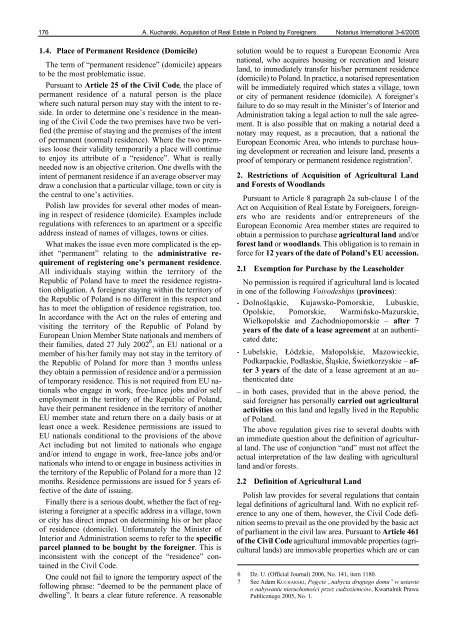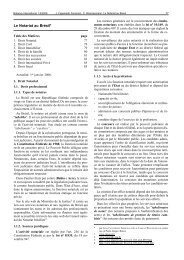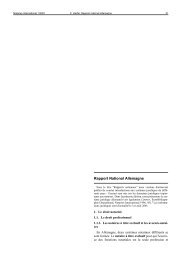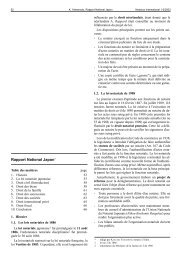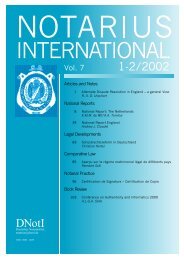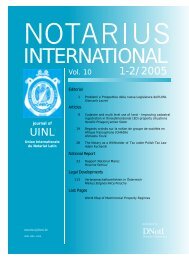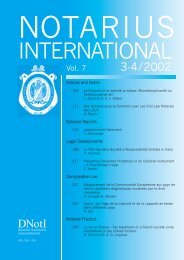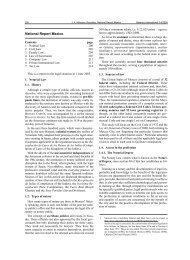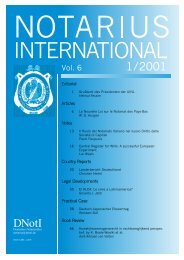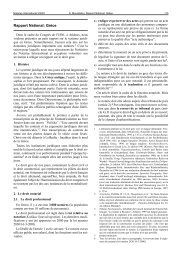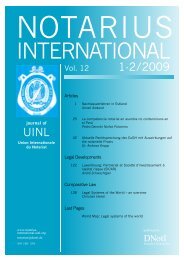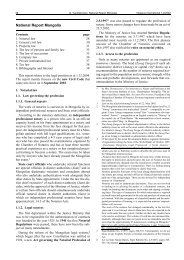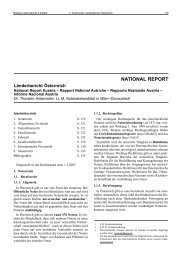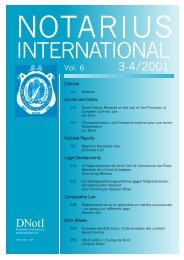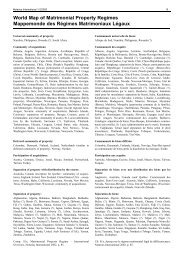Create successful ePaper yourself
Turn your PDF publications into a flip-book with our unique Google optimized e-Paper software.
176 A. Kucharski, Acquisition of Real Estate in Poland by Foreigners <strong>Notarius</strong> <strong>International</strong> 3-4/<strong>2005</strong><br />
1.4. Place of Permanent Residence (Domicile)<br />
The term of “permanent residence” (domicile) appears<br />
to be the most problematic issue.<br />
Pursuant to Article 25 of the Civil Code, the place of<br />
permanent residence of a natural person is the place<br />
where such natural person may stay with the intent to reside.<br />
In order to determine one’s residence in the meaning<br />
of the Civil Code the two premises have two be verified<br />
(the premise of staying and the premises of the intent<br />
of permanent (normal) residence). Where the two premises<br />
loose their validity temporarily a place will continue<br />
to enjoy its attribute of a “residence”. What is really<br />
needed now is an objective criterion. One dwells with the<br />
intent of permanent residence if an average observer may<br />
draw a conclusion that a particular village, town or city is<br />
the central to one’s activities.<br />
Polish law provides for several other modes of meaning<br />
in respect of residence (domicile). Examples include<br />
regulations with references to an apartment or a specific<br />
address instead of names of villages, towns or cities.<br />
What makes the issue even more complicated is the epithet<br />
“permanent” relating to the administrative requirement<br />
of registering one’s permanent residence.<br />
All individuals staying within the territory of the<br />
Republic of Poland have to meet the residence registration<br />
obligation. A foreigner staying within the territory of<br />
the Republic of Poland is no different in this respect and<br />
has to meet the obligation of residence registration, too.<br />
In accordance with the Act on the rules of entering and<br />
visiting the territory of the Republic of Poland by<br />
European Union Member State nationals and members of<br />
their families, dated 27 July 2002 6 , an EU national or a<br />
member of his/her family may not stay in the territory of<br />
the Republic of Poland for more than 3 months unless<br />
they obtain a permission of residence and/or a permission<br />
of temporary residence. This is not required from EU nationals<br />
who engage in work, free-lance jobs and/or self<br />
employment in the territory of the Republic of Poland,<br />
have their permanent residence in the territory of another<br />
EU member state and return there on a daily basis or at<br />
least once a week. Residence permissions are issued to<br />
EU nationals conditional to the provisions of the above<br />
Act including but not limited to nationals who engage<br />
and/or intend to engage in work, free-lance jobs and/or<br />
nationals who intend to or engage in business activities in<br />
the territory of the Republic of Poland for a more than 12<br />
months. Residence permissions are issued for 5 years effective<br />
of the date of issuing.<br />
Finally there is a serious doubt, whether the fact of registering<br />
a foreigner at a specific address in a village, town<br />
or city has direct impact on determining his or her place<br />
of residence (domicile). Unfortunately the Minister of<br />
Interior and Administration seems to refer to the specific<br />
parcel planned to be bought by the foreigner. This is<br />
inconsistent with the concept of the “residence” contained<br />
in the Civil Code.<br />
One could not fail to ignore the temporary aspect of the<br />
following phrase: “deemed to be the permanent place of<br />
dwelling”. It bears a clear future reference. A reasonable<br />
solution would be to request a European Economic Area<br />
national, who acquires housing or recreation and leisure<br />
land, to immediately transfer his/her permanent residence<br />
(domicile) to Poland. In practice, a notarised representation<br />
will be immediately required which states a village, town<br />
or city of permanent residence (domicile). A foreigner’s<br />
failure to do so may result in the Minister’s of Interior and<br />
Administration taking a legal action to null the sale agreement.<br />
It is also possible that on making a notarial deed a<br />
notary may request, as a precaution, that a national the<br />
European Economic Area, who intends to purchase housing<br />
development or recreation and leisure land, presents a<br />
proof of temporary or permanent residence registration 7 .<br />
2. Restrictions of Acquisition of Agricultural Land<br />
and Forests of Woodlands<br />
Pursuant to Article 8 paragraph 2a sub-clause 1 of the<br />
Act on Acquisition of Real Estate by Foreigners, foreigners<br />
who are residents and/or entrepreneurs of the<br />
European Economic Area member states are required to<br />
obtain a permission to purchase agricultural land and/or<br />
forest land or woodlands. This obligation is to remain in<br />
force for 12 years of the date of Poland’s EU accession.<br />
2.1 Exemption for Purchase by the Leaseholder<br />
No permission is required if agricultural land is located<br />
in one of the following Voivodeships (provinces):<br />
- Dolnoœl¹skie, Kujawsko-Pomorskie, Lubuskie,<br />
Opolskie, Pomorskie, Warmiñsko-Mazurskie,<br />
Wielkopolskie and Zachodniopomorskie – after 7<br />
years of the date of a lease agreement at an authenticated<br />
date;<br />
- Lubelskie, £ódzkie, Ma³opolskie, Mazowieckie,<br />
Podkarpackie, Podlaskie, Œl¹skie, Œwietkorzyskie – after<br />
3 years of the date of a lease agreement at an authenticated<br />
date<br />
– in both cases, provided that in the above period, the<br />
said foreigner has personally carried out agricultural<br />
activities on this land and legally lived in the Republic<br />
of Poland.<br />
The above regulation gives rise to several doubts with<br />
an immediate question about the definition of agricultural<br />
land. The use of conjunction “and” must not affect the<br />
actual interpretation of the law dealing with agricultural<br />
land and/or forests.<br />
2.2 Definition of Agricultural Land<br />
Polish law provides for several regulations that contain<br />
legal definitions of agricultural land. With no explicit reference<br />
to any one of them, however, the Civil Code definition<br />
seems to prevail as the one provided by the basic act<br />
of parliament in the civil law area. Pursuant to Article 461<br />
of the Civil Code agricultural immovable properties (agricultural<br />
lands) are immovable properties which are or can<br />
6 Dz. U. (Official Journal) 2006, No. 141, item 1180.<br />
7 See Adam KUCHARSKI, Pojêcie „nabycia drugiego domu” w ustawie<br />
o nabywaniu nieruchomoœci przez cudzoziemców, Kwartalnik Prawa<br />
Publicznego <strong>2005</strong>, No. 1.


